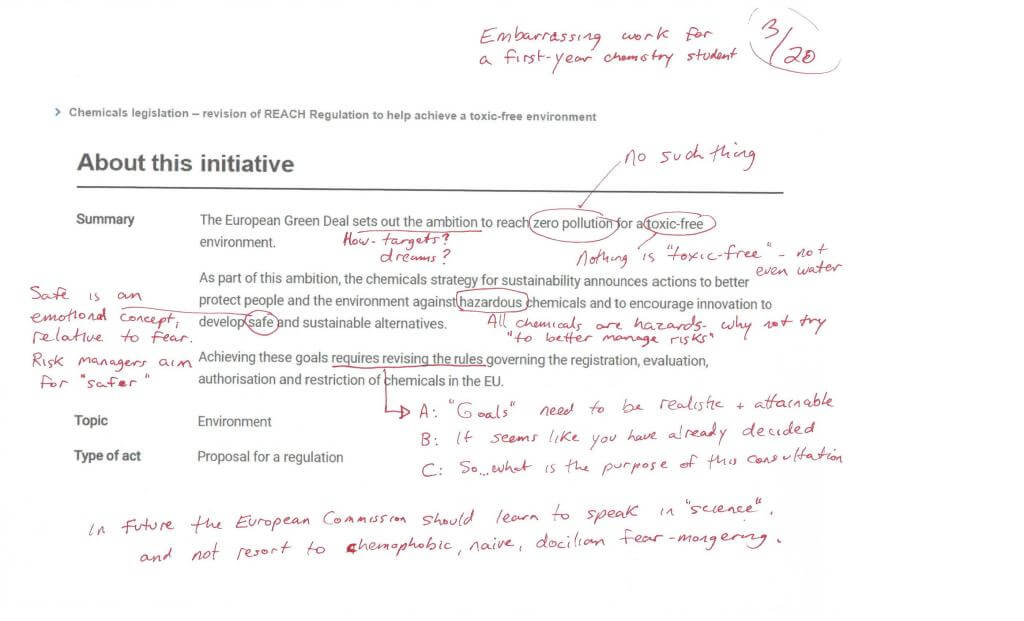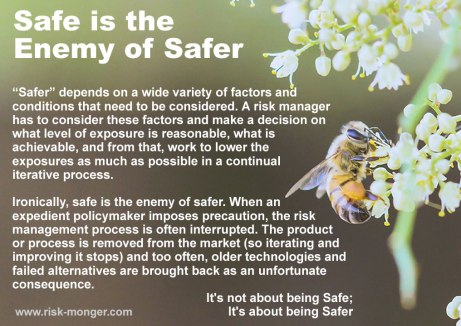I am going to use my contribution to the consultation to “help achieve a toxic-free environment” (their words) as a plea for the European Commission to stop dreaming of a world of rainbows and unicorns and start respecting basic scientific principles.
Scientists around the world are snickering at the lack of academic intelligence coming from European Commissioner Sinkevičius’ draft proposals. I am terrified by the consequences of such naïve chemophobia at the heart of European policy which will likely lead to a further exodus from the EU of scientific talent, innovative companies and research investment.

If the European Commission does not understand how ridiculous they are beginning to look outside of their Bubble, we need look no further than the naïve vocabulary in the invitation to the consultation. It was clearly written by activist ideologues and not proofread by anyone with a basic scientific education. Some examples.
Ambition: “Zero pollution”

The European Green Deal declares the modest ambition of zero pollution. Without having to get too deep into evidence, there is no such thing as zero pollution and putting that as a target (rather than “reducing pollution”) is not only nonsensical, it risks promoting less sustainable practices to achieve inflexible objectives. Wherever there is consumption, there is pollution and recycling, while redemptionary, is not an absolution. Even something as easy as recycling paper consumes energy, increases wastewater and chemicals going into the environment. Such an ambition will likely block rational thinking by narrowing the options and will likely lead to more unsustainable decisions.
A zealot who speaks in absolutes (zero plastics, zero fossil fuels, zero nuclear, zero pesticides…) is removing the necessary pragmatic means to produce less pollution. Add to this the activist obsession to only apply natural-based solutions and we begin to see that the European Union’s path to sustainability is being led by political ideology rather than scientific evidence. For example, some plastics may better be recycled by recovering their energy via incineration but if some bureaucrat defines that as pollution, then the cost to the environment in trying to repurpose the chemicals into a second-rate product will be anything but sustainable.
Zero pollution is not an ambition but an unrealistic and highly dangerous dream demanded by uncompromising zealots and ideologues that will likely lead to higher levels of waste and pollution.
“For a toxic-free environment”

The quest for a “toxic-free” environment is just plain stupid and the European Commission has been corrected on this word choice many times over the last year. That they continue to include such a ridiculous term in their European Green Deal documentation indicates how DG Environment has been captured by chemophobic activists with no understanding of science.
Toxicity depends on the dose (Paracelsus: the dose makes the poison). Two aspirins can be very beneficial to humans but 200 will be quite toxic. Water can be toxic to humans if consumed in a large enough volume. (I can’t believe I have to waste my time explaining this to EU civil servants who net €7000 a month but can’t be bothered to listen or think.)
To refer to some chemicals as toxic (and by that, only consider synthetic chemicals) is uneducated nonsense. A single cup of coffee contains over 1000 (natural) chemicals; we have only tested 22 of them and 17 are carcinogenic to rats (Bruce Ames). There are more carcinogens in that single cup than all of the pesticide residues from a year’s consumption of fruit and vegetables (Bruce Ames). Coffee also contains known endocrine disrupting chemicals (not suspected ones).
As much as I love coffee (and probably expose myself to far more than the recommended daily dose levels), if the European Commission continues to use such ridiculous vocabulary in its final legislation, I plan to introduce a citizens’ initiative to ban coffee in the EU. This satirical pantomime will likely tie up a group of civil servants for a good five years but hopefully such an expensive exercise will provide valuable pedagogical purpose. There is no such thing as “toxic-free” so please stop the stupid.
“To better protect people and the environment against hazardous chemicals”

Why didn’t the European Commission say “to better manage chemical risks”? All chemicals, including natural ones, have a certain level of toxicity – the exposure to which can be hazardous. Once again, the dose makes the poison and chemical risk management entails reducing the exposure to as low as reasonably achievable (ALARA).
But I fear that the activists behind this present policy strategy want to revise REACH, turning it into a hazard-based regulation where there is no question of managing exposures to enjoy the benefits of chemical substances. Under this game-plan, if something is deemed “toxic” then it is hazardous (and any level of exposure is considered a threat). The EEA interpretation of the precautionary principle fits nicely into this hazard-based approach (why the activists demand this uncertainty management tool at the regulatory level) but the reality that even water can be toxic makes such a policy tool unworkable and irrational.
To give an example of the dangers of a policy built on such chemophobic cultist ideology, all disinfectants and sanitisers used in the fight against COVID-19 would not be allowed onto the EU market if the hazard-based approach were to be consistently applied in a revised REACH regulation.
“To develop safe alternatives”

It took a badly botched COVID-19 pandemic strategy implementation to show how incompetent most European authorities were at managing risks. European citizens were assured they would be safe (if they just stayed home and washed their hands). The low-point came when European Commission authorities over-reacted to a few dozen blood-clot cases suspected to have originated from the AstraZeneca vaccine. A large number of nations took the precautionary approach and suspended the vaccine roll-out until safety could be guaranteed. This not only contributed to vaccine hesitancy, it advanced the unrealistic expectation that people could be kept 100% safe and risk-free.
I was horrified to hear European Commissioner for Economy, Paolo Gentiloni, claim “precautionary measures are justified” until further assessment from the European Medicines Agency can “give certainty to our EU citizens.” That a Commissioner went so far as to praise this dereliction of duty demonstrates how lost and confused EU officials are at even understanding their role as risk managers. Nothing is 100% safe (but there are some things that are safer than others). The risk of a blood clot from a vaccine is extremely low, especially when compared to the risk of clotting (or worse) from contracting the latest coronavirus.
In a risk-based world, reducing exposure to hazards will make you safer; in a hazard-based world, removing hazards will make you safe. Except … in the real world, you cannot remove most hazards. So when the European Commission tells its citizens they will be kept “safe” from any “toxic” chemicals, this implies that anything not 100% safe (ie, everything) will be taken off of the European market. “Safe” is an emotional concept; “safer” is a risk management objective. Effective disinfectants are not safe but they are far safer than infections and contaminations. The European Commission needs to stop spreading this misconception that they can keep their citizens safe. They need to stop raising expectations in a terrified public they will never be able to keep.
Activist intentions
Just from the nature of the vocabulary in the European Commission’s invitation to their consultation, we can see how the activists from NGOS like EDC-Free Europe, Pesticide Action Network and Friends of the Earth are running the show in DG Environment. They seek a revision of the REACH chemicals regulation that will be hazard-based (ignoring any question of dose or exposure). If a chemical cannot be determined with certainty to be safe (ie, non-toxic) then the precautionary principle will be applied and the substance will be taken off of the market.
Any grade six science student will understand that this will then apply to all substances, natural or synthetic. What the environmental activists lobbying for this revision intend is to have a series of chemicals from their little blacklists removed from the market – they are concerned with winning and hence increasing their funding, not with having a workable European legislation and definitely not with having a more sustainable environment.
The activists are not focusing on developing innovative substances to improve the quality of life or enhancing prosperity. For these activists, it is only about the precautionary removal of all synthetic substances deemed by some activist groups as unworthy for their ideal, naturopathic world vision – one paid for by others (both financially and consequentially).
And the European Commission, without any leadership, is playing foolishly into their hands. Just wait until Professor Zaruk starts his citizens’ initiative to have coffee banned in the EU!
So my advice for this European Commission consultation on revising REACH is for European civil servants to start consulting scientists and stop listening to activists who put political ideology above sustainability and technological solutions. The concepts the European Commission are using, like toxic-free, safe and zero-pollution are emotional dreams which, like unicorns, don’t exist. Please stop perpetuating chemophobia and scientific illiteracy and do not continue on this path laid out by activist ideologues that will deliver anything but sustainability.
David Zaruk has been an EU risk and science communications specialist since 2000, active in EU policy events from REACH and SCALE to the Pesticides Directive, from Science in Society questions to the use of the Precautionary Principle. Follow him on Twitter @zaruk
A version of this article was originally posted at Risk Monger and has been reposted here with permission.































